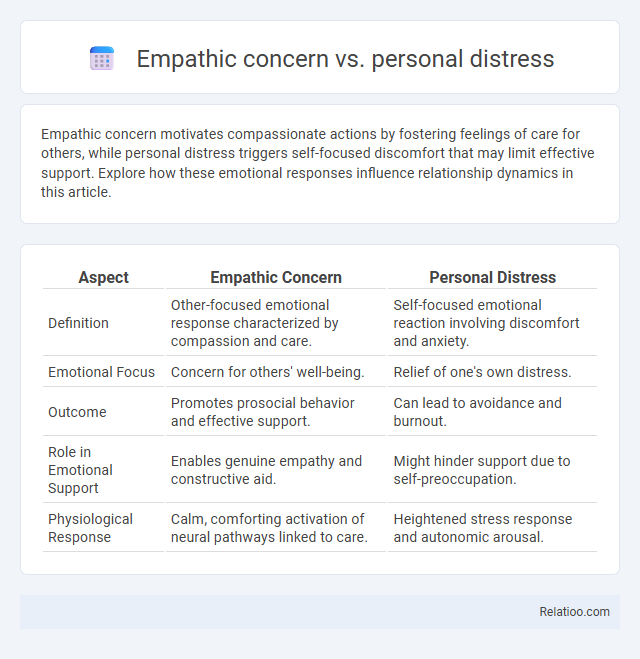Empathic concern motivates compassionate actions by fostering feelings of care for others, while personal distress triggers self-focused discomfort that may limit effective support. Explore how these emotional responses influence relationship dynamics in this article.
Table of Comparison
| Aspect | Empathic Concern | Personal Distress |
|---|---|---|
| Definition | Other-focused emotional response characterized by compassion and care. | Self-focused emotional reaction involving discomfort and anxiety. |
| Emotional Focus | Concern for others' well-being. | Relief of one's own distress. |
| Outcome | Promotes prosocial behavior and effective support. | Can lead to avoidance and burnout. |
| Role in Emotional Support | Enables genuine empathy and constructive aid. | Might hinder support due to self-preoccupation. |
| Physiological Response | Calm, comforting activation of neural pathways linked to care. | Heightened stress response and autonomic arousal. |
Understanding Empathic Concern
Empathic concern involves feeling compassion and concern for others' well-being, motivating prosocial behavior without overwhelming your own emotions. Personal distress, in contrast, refers to self-focused feelings of discomfort or anxiety when witnessing another's suffering, which can hinder effective help. Understanding empathic concern emphasizes recognizing others' emotions while maintaining emotional balance to support them effectively.
Defining Personal Distress
Personal distress refers to the self-focused emotional discomfort and anxiety experienced when witnessing another person's suffering, contrasting with empathic concern, which involves other-oriented feelings of compassion and care. Unlike empathic concern that motivates prosocial behavior, personal distress can lead to withdrawal or avoidance to reduce one's own discomfort. Understanding your personal distress is crucial for managing emotional responses and effectively supporting others without becoming overwhelmed.
Key Differences Between Empathic Concern and Personal Distress
Empathic concern involves feeling compassion and care for others' well-being, prompting prosocial behavior, whereas personal distress is a self-focused emotional response characterized by discomfort and anxiety in reaction to another's suffering. Empathic concern motivates helping actions driven by other-oriented feelings, while personal distress often leads to avoidance to alleviate one's own discomfort. The key differentiation lies in empathic concern's outward, compassionate orientation versus personal distress's inward, self-protective focus.
Psychological Foundations of Empathic Responses
Empathic concern involves feelings of compassion and care for others, driven by an other-oriented emotional response rooted in prosocial motivation. Personal distress refers to self-focused discomfort and anxiety arising from witnessing another's suffering, often leading to avoidance behaviors. Psychological foundations distinguish empathic concern as promoting altruistic actions, whereas personal distress can trigger egoistic responses aimed at reducing one's own distress.
Emotional Outcomes: Empathic Concern vs. Personal Distress
Empathic concern leads to prosocial emotional outcomes, characterized by feelings of compassion and a genuine desire to help others in distress. Personal distress generates self-focused negative emotions such as discomfort and anxiety, often resulting in avoidance behaviors rather than assistance. Empathic concern promotes long-term emotional resilience and social bonding, while personal distress tends to trigger immediate, self-centered emotional reactions.
Impact on Prosocial Behavior
Empathic concern, characterized by feelings of warmth and compassion towards others, strongly predicts increased prosocial behavior by motivating individuals to help those in need. Personal distress, an aversive self-focused emotional response to others' suffering, often inhibits prosocial actions due to the desire to alleviate one's own discomfort rather than the other's situation. High levels of empathic concern facilitate sustained prosocial engagement, whereas personal distress may trigger avoidance, highlighting the differential impacts on helping behaviors.
Factors Influencing Empathic Reactions
Empathic concern is driven by factors such as perceived similarity, prosocial motivation, and emotional contagion, whereas personal distress is influenced by self-oriented discomfort and situational stress levels. Cognitive appraisal processes and individual differences in emotional regulation significantly modulate empathic reactions, affecting whether concern or distress predominates. Contextual elements, including social norms and relational closeness, further shape the intensity and type of empathy experienced.
Empathy in Social and Clinical Settings
Empathic concern involves other-focused feelings of compassion and care, promoting prosocial behavior in social and clinical settings, whereas personal distress is a self-focused, aversive emotional reaction that can hinder effective support. Empathy enhances interpersonal relationships by fostering understanding and emotional connection, critical in therapeutic contexts for patient outcomes. Your ability to balance empathic concern without succumbing to personal distress is essential for maintaining emotional resilience and providing effective care.
Managing Personal Distress for Better Empathy
Managing personal distress enhances your capacity for empathic concern by reducing self-focused discomfort that can hinder compassionate responses. Techniques such as mindfulness and emotion regulation help shift attention from overwhelming personal feelings to the needs of others. Cultivating this balance improves social connections and emotional support by allowing genuine empathy without being consumed by distress.
Fostering Healthy Empathic Concern
Fostering healthy empathic concern involves promoting compassionate feelings towards others without overwhelming personal distress, which can lead to emotional burnout and withdrawal. Empathic concern motivates prosocial behavior by enabling individuals to respond with care and support, whereas personal distress often triggers self-focused discomfort that hinders effective helping. Cultivating balanced empathic concern enhances emotional resilience and social bonding, improving overall well-being and interpersonal relationships.

Infographic: Empathic concern vs Personal distress
 relatioo.com
relatioo.com